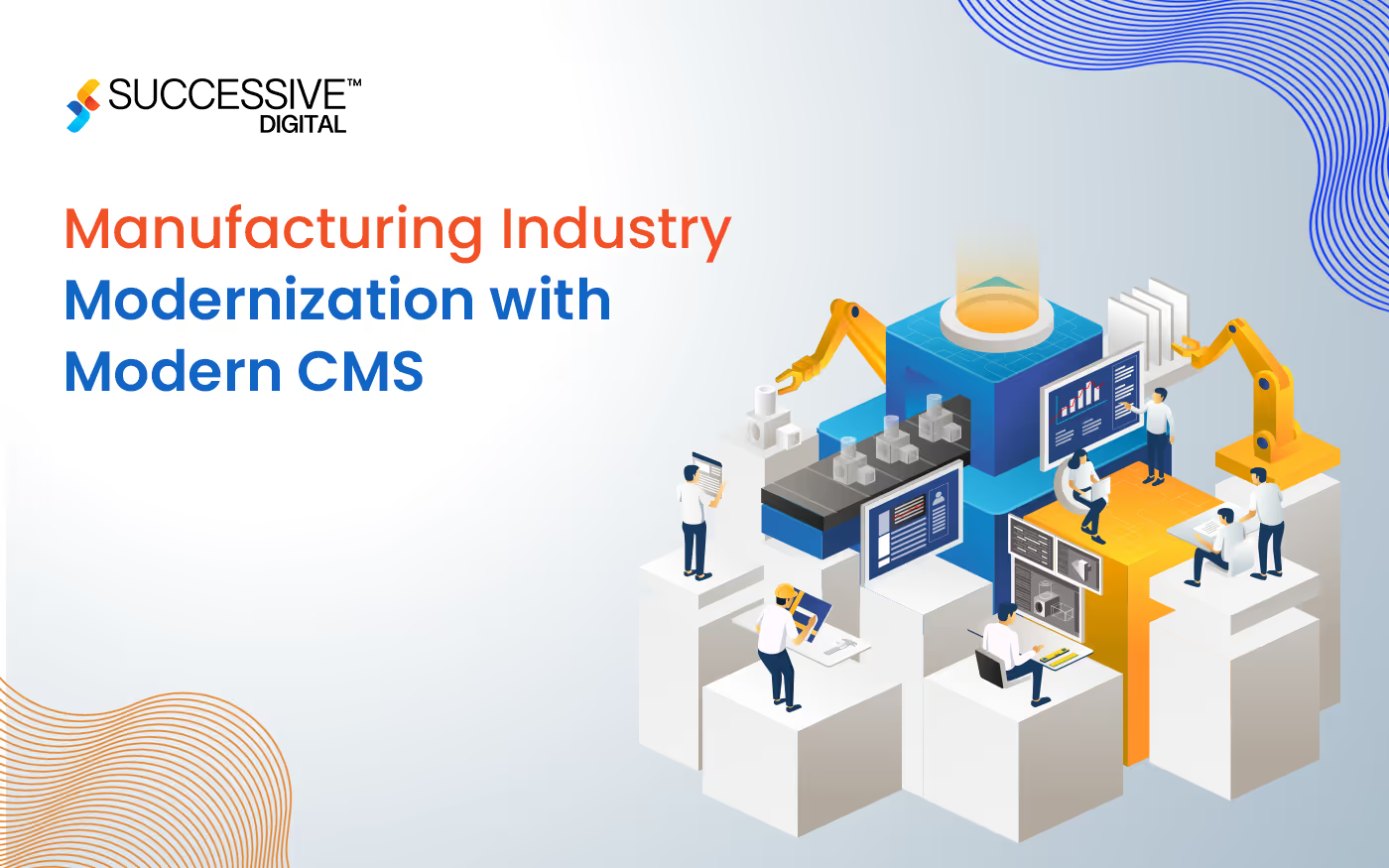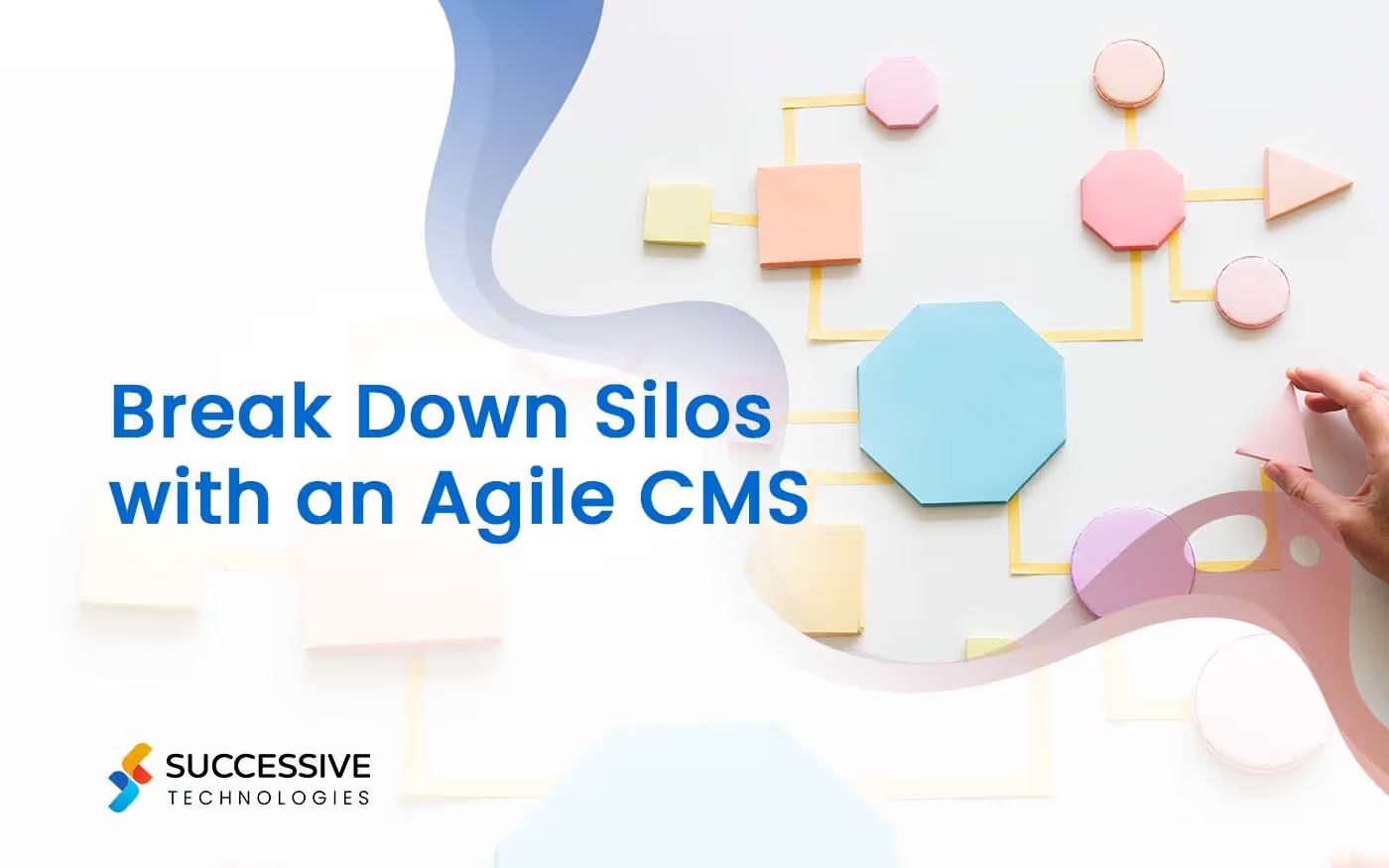The manufacturing industry is at a pivotal point in its digital transformation journey going full circle in the industry 4.0 era. This means the industry has witnessed a significant shift towards smart manufacturing, powered by the integration of advanced technologies such as the Internet of Things (IoT), Artificial Intelligence (AI), robotics, and big data. This shift is not just a trend anymore but a necessity for businesses looking to thrive in the industry. A study by Deloitte shows that 86% of manufacturing industry stakeholders believe that smart factory solutions will be the primary drivers of competitiveness in the next five years. Hence, companies that embrace modernization are better positioned to optimize production, reduce costs, and enhance their competitive edge.Despite this promising growth, about 74% of manufacturing companies still rely on outdated legacy systems and traditional processes. These systems often lack the flexibility needed to support real-time data access, cross-departmental collaboration, and seamless integration with emerging technologies. As a result, manufacturers face numerous challenges, including siloed data management, inefficient workflows, and increased operational costs. Also, remember that B2B buyers expect the same level of customer service and personalization as delivered in the B2C space. Hence, the journey of digital modernization is not over with changing systems or technologies; it’s about shifting the paradigm and redefining how information is managed, delivered, and consumed. Here, a content management system (CMS) plays a critical role. With modernization at the forefront, transitioning from your existing traditional CMS to a modern CMS is also necessary. The latter offers advanced capabilities like a headless architecture, omnichannel content delivery, and AI-driven personalization, which are essential for manufacturers aiming to modernize their digital ecosystems. The CMS serves as the backbone for delivering consistent, dynamic content across multiple channels and touchpoints, from customer-facing websites and mobile apps to employee portals and IoT devices. To enable modernization within your system, you can take assistance from a professional digital transformation company that will have enough expertise to provide a seamless transition to modern architecture.
Understanding the Evolution and Digital Transformation in Manufacturing Domain
The evolution of the manufacturing industry has been marked by several key milestones, from automation and robotics as a part of Industry 3.0 to smart manufacturing and autonomous systems in Industry 4.0. Today, the focus is on optimizing production processes, predicting maintenance needs on the go, and enhancing operational efficiency. The transition to Industry 4.0 is not just about upgrading machinery; it's about adopting a holistic digital-first approach that transforms how manufacturers operate, interact with customers, and manage their data.Here’s a closer look at the evolution:
- Industry 3.0 (1960 - 2010): This phase was characterized by the introduction of computers, automation, and robotics into the manufacturing process. Machines were programmed to perform repetitive tasks, which led to increased production speed and reduced human error. However, the processes were largely isolated, with minimal communication between different systems. For example- a car assembly line uses robotic arms to weld car frames together. While the automation speeds up production, the robots function independently without feedback from other parts of the factory.
- Industry 4.0 (2011 - present): This era focuses on smart manufacturing, where interconnected systems communicate with each other in real-time to optimize production. The key technologies driving this transformation include the Internet of Things (IoT), Artificial Intelligence (AI), and big data. The ability to connect machines, sensors, and software enables manufacturers to make data-driven decisions, monitor equipment health, predict maintenance needs, and improve quality control. For example, a smart factory uses IoT sensors on machinery to monitor vibration levels and temperature in real-time. If the data indicates a potential issue, an AI algorithm can predict when a machine might fail and schedule maintenance before a breakdown occurs, minimizing downtime.
Challenges Faced by Traditional Manufacturers
The manufacturing industry has long been characterized by legacy systems and traditional processes that, while once sufficient, now present significant barriers to growth and competitiveness in the digital age. As manufacturers attempt to modernize, several key challenges emerge, particularly around outdated technology, fragmented data management, difficulty in integrating new solutions, and rising customer expectations. Let's break down these challenges in detail:
- Outdated IT Infrastructure and Legacy Systems
Traditional manufacturers often rely on legacy systems that were designed for a different era of manufacturing. These systems include outdated Enterprise Resource Planning (ERP) software, on-premises servers, and custom-built applications that are difficult to update or replace. Legacy systems are not built to handle the demands of Industry 4.0, where connectivity, real-time data, and automation are paramount. As a result, manufacturing enterprises that are still relying on outdated systems struggle to adopt new technologies such as cloud computing, IoT, AI, and machine learning in their ecosystem, which leads to higher losses.In legacy environments, data is often stored in different systems that don’t communicate with each other, making it difficult to gain a unified view of the business. For instance, product data might be stored in one system, customer information in another, and inventory records in yet another. This fragmentation often hampers decision-making processes and decelerates operations.
- Silos in Data Management and Communication
Data silos are a significant problem for traditional manufacturers, where different departments—such as production, engineering, sales, and marketing—operate with their own isolated data sources. When data is stored in separate systems, it becomes challenging to get a holistic view of the organization’s performance. For example, a manufacturing plant may not have real-time access to sales data, limiting its ability to adjust production schedules based on demand. This siloed data module hinders collaboration across departments and downgrades productivity. It also results in duplicated efforts and redundant processes. For example, manually transferring data from one system to another increases the risk of errors and consumes valuable time that could be better spent on value-added tasks.
- Difficulty in Integrating New Technologies with Existing Processes
Integrating modern technologies like cloud-based applications, IoT devices, and AI-driven analytics into a traditional manufacturing setup presents significant difficulties. These systems were built without modern integration standards in mind, hence making it a challenge to connect the system with new technologies. For example, integrating an IoT-based predictive maintenance solution with an old ERP system may require extensive custom coding and middleware solutions and might create downtime in between because of the present data siloes. Moreover, introducing new technology often means changing established workflows, which can face resistance from employees who are accustomed to traditional methods. Training staff to use new tools and adapt to new processes is a critical but often underestimated challenge.
- Growing Customer Expectations for Personalized Experiences and Rapid Delivery
The expectations of customers in the manufacturing sector have evolved considerably, driven by the digitalization of other industries. Today's customers, whether they are businesses or end consumers, expect:
- Personalized products and experiences: B2B customers are increasingly looking for custom solutions tailored to their specific requirements, while B2C customers expect personalized products and digital experiences. Traditional manufacturers may struggle to meet these expectations with rigid processes and outdated content management systems.
- Rapid and flexible delivery: The "Amazon effect" has influenced customer expectations for fast and on-demand delivery, not just in consumer goods but across industries, including manufacturing. Traditional manufacturers, often hampered by slow production cycles and long lead times, may find it difficult to meet these expectations without modernizing their processes.
- Transparency and real-time information: Customers want visibility into the entire supply chain, from order placement to delivery. Traditional systems that lack real-time data capabilities make it difficult for manufacturers to provide accurate and timely updates to customers.
The Role of a Modern CMS in Manufacturing Industry Modernization
Manufacturing is a complex and rapidly evolving industry, and embracing digital transformation has become essential for companies looking to thrive in the industry. As part of this transformation, content management plays a significant role, especially when companies need to manage large volumes of technical data, product documentation, and communication across diverse channels. A modern Content Management System (CMS) addresses the shortcomings of traditional CMS solutions, helping manufacturers navigate their digital journey more efficiently.
What Sets a Modern CMS Apart from a Legacy CMS?
Traditional CMS platforms were designed for simpler, static websites, limiting their ability to scale and adapt to more complex requirements. Here’s how a modern CMS brings a change to this:
- Headless Architecture: A modern CMS operates on a headless architecture, which decouples content creation from content delivery. This separation allows manufacturers to push content across various front-end platforms, such as websites, mobile apps, kiosks, and even connected devices. By decoupling the back-end content management from the front-end presentation layer, manufacturers can create and manage content independently of the systems that display it. This flexibility supports faster content delivery, easier updates, and a better user experience across multiple channels without needing to re-code the entire system for each update.
- API-First Approach: Legacy CMS systems struggle with integration, relying on rigid, predefined functionalities. A modern CMS, on the other hand, is built on an API-first approach, meaning it’s designed from the ground up to integrate with other software through Application Programming Interfaces (APIs). For manufacturers, this is critical because their operations involve a complex web of systems like Enterprise Resource Planning (ERP), Product Information Management (PIM), and Customer Relationship Management (CRM). With an API-first CMS, manufacturers can seamlessly connect all these systems, enabling real-time data sharing and a unified approach to content across the organization. To migrate from your legacy CMS to a modern enterprise CMS, hire a professional enterprise CMS development company.
- Omnichannel Content Distribution: In today’s digital world, manufacturing companies must reach customers, suppliers, and internal teams through multiple channels. A modern CMS is built to distribute content across any digital touchpoint, whether it’s a website, mobile app, smart kiosk, wearable device, or even a voice assistant. This omnichannel capability is essential for manufacturers because it ensures consistency and uniformity in the content delivered across all platforms, reducing errors and improving the overall customer experience.
Core Features of a Modern CMS Relevant to Manufacturing
A modern CMS comes with a set of advanced features that cater specifically to the unique needs of the manufacturing industry:
- Content Modeling and Flexibility: Manufacturing businesses often manage complex data structures, including product specifications, compliance documents, training materials, and more. Modern CMS platforms offer highly flexible content models, allowing businesses to define, organize, and manage different types of content without restrictions. For example, a manufacturing company can create different templates for product pages, instruction manuals, and compliance documentation, ensuring that each type of content follows a standardized format that is easy to manage and navigate for users.
- Advanced Personalization Capabilities: Manufacturing companies typically serve a diverse audience, including B2B clients, suppliers, distributors, and employees. Each of these segments has unique content needs. A modern CMS allows manufacturers to implement advanced personalization strategies, delivering tailored content to specific user segments based on their behavior, preferences, and interactions. For example, a B2B client might receive personalized product catalogs and pricing, while an internal team member might access training resources or compliance materials tailored to their department.
Also read: The challenges and opportunities of Headless CMS migration.
- Robust Security Features: The manufacturing industry deals with sensitive data, ranging from intellectual property (e.g., product designs) to customer information. A modern CMS, such as Strapi, has advanced security features that ensure data is protected from breaches and unauthorized access. These features include a Role-based access control feature (which limits access based on user roles), a Single sign-on feature (to authenticate users), data encryption capability (which protects information in transit and at rest), and regular security updates. Additionally, modern CMS platforms often help manufacturers comply with global data protection regulations, such as the General Data Protection Regulation (GDPR) and the California Consumer Privacy Act (CCPA), essential for protecting customer data and avoiding penalties.
Benefits of Implementing a Modern CMS in the Manufacturing Industry
Adopting a modern CMS in the manufacturing industry is not just about transitioning from a legacy CMS. It also involves new terms and strategies, as well as bringing a transformative shift in how these companies manage operations and engage with customers across all touchpoints. In this section, we will explore the key benefits of implementing modern CMS in the manufacturing domain.
- Centralized and Streamlined Content Management
A modern CMS centralizes content across various departments, including engineering, sales, marketing, and customer service. This unification simplifies the management of disparate content types, such as product specifications, compliance documents, training materials, and marketing collateral. With a centralized repository, manufacturers can ensure that all teams have access to the most up-to-date information, reducing the risk of outdated or conflicting materials. Additionally, it streamlines the process of updating content, allowing for quick dissemination of changes across all channels. This not only enhances operational efficiency but also strengthens collaboration among departments, as everyone operates from a single source of truth. The result is a more cohesive approach to content management, leading to improved productivity and consistency in content management and delivery.
- Enhanced Customer Experience
A modern CMS significantly enhances the customer experience by enabling manufacturers to create personalized and interactive digital touchpoints. By leveraging data about customer preferences and behaviors, manufacturers can develop tailored content that resonates with different segments, such as B2B clients, suppliers, and end consumers. For instance, personalized product pages can showcase relevant information and recommendations, while self-service portals provide customers with easy access to technical documentation and FAQs. Furthermore, integrating the CMS with various digital channels, such as mobile applications, smart kiosks, and voice assistants, ensures that customers receive a seamless experience regardless of the platform they choose. This multifaceted approach not only improves customer satisfaction but also builds brand loyalty, as customers are more likely to engage with companies that understand and cater to their needs.Also read- Travel industry modernization with a Headless CMS
- Real-Time Data Access and Utilization
One of the standout features of a modern CMS is its ability to integrate with IoT systems and other real-time data sources. This integration allows manufacturers to provide timely updates on supply chain processes, inventory levels, and production schedules directly within their content management system. For example, real-time data feeds can update technical documentation or maintenance guides based on current operational conditions, ensuring that employees and customers always have access to the most relevant information. This capability not only enhances decision-making but also supports proactive maintenance strategies, as teams can anticipate issues before they arise based on data trends.
- Operational Efficiency and Cost Reduction
The built-in automation features of a modern CMS can lead to substantial operational efficiencies and cost reductions. Routine content management tasks, such as updating product information across multiple sales channels or maintaining compliance documentation, can be automated, significantly reducing the time and effort required by staff. By streamlining these processes, manufacturers can allocate resources more effectively, focusing on strategic initiatives rather than manual, repetitive tasks. Additionally, transitioning to a digital content management system reduces reliance on paper-based documentation, leading to lower printing costs and decreased environmental impact.
- Supporting Compliance and Regulatory Requirements
In the manufacturing sector, compliance with industry regulations and standards is paramount. A modern CMS facilitates this by centralizing regulatory documents and ensuring they are easily accessible and up-to-date. Automated version control features help maintain compliance documentation, reducing the risk of errors that can lead to breaches. Furthermore, by providing role-based access controls, manufacturers can ensure that sensitive information is only available to authorized personnel, enhancing data security. A modern CMS not only simplifies compliance management but also mitigates risks associated with non-compliance, safeguarding the company's reputation and financial health.
Manufacturing Industry Modernization: A Real-World Success Story
Successive Digital enabled modernization for a leading manufacturing industry and revamped their website from Drupal 7 to Drupal 10, a modern CMS version.Prior to the revamp, the company was facing significant challenges with outdated content workflows, siloed data across departments, and limited capabilities for digital engagement. By deploying Drupal 10, the company was able to transform its content management processes, improve the UI/UX of its website for better customer experience, and shift from manual updates and disconnected systems to a centralized platform that streamlined content creation, collaboration, and distribution. The integration of the CMS with key enterprise systems, such as ERP for inventory management and CRM for customer data, enabled a cohesive approach to content delivery, ensuring that product information, technical documentation, and marketing materials were consistently updated across multiple digital touchpoints, including websites, mobile apps, and partner portals. This modernization not only enhanced customer experiences by providing personalized, real-time content but also improved internal efficiency, significantly reducing the time required for content updates. The result was a marked increase in customer engagement, accelerated sales cycles, and measurable improvements in sales productivity, showcasing the pivotal role of modern Drupal in driving business growth and operational excellence.
Key Trends in the Manufacturing Domain and the Role of Modern CMS in It
- Rise of Additive Manufacturing (3D Printing)
Additive manufacturing is gaining traction as a key trend, enabling manufacturers to produce complex and customized components faster and at lower costs. This shift from traditional subtractive manufacturing to 3D printing encourages more innovation and flexibility in the production process. Modern CMS can support this trend by managing digital files, blueprints, and product data required for 3D printing. It can also facilitate version control, ensuring that the latest designs are accessible to engineers and designers simultaneously. This is crucial for maintaining accuracy and quality in a production environment where prototypes and specifications frequently change.
- Increased Focus on Sustainability and Green Manufacturing
Sustainability is becoming a priority in manufacturing. Companies are looking for ways to minimize their environmental impact through green manufacturing practices like reducing waste, using renewable energy, and adopting circular economy principles. Modern CMS solutions can aid in this transition by providing a centralized platform to manage and share sustainability reports, compliance documents, and best practices. It can also support the traceability of raw materials and production processes, ensuring transparency throughout the supply chain. This contributes to improved environmental compliance and customer trust.Also read: How modern enterprise CMS can transfrom your content workflows
- Expansion of IoT and Digital Twins in Manufacturing
The use of IoT and digital twins (virtual replicas of physical assets), is on the rise in manufacturing. These technologies allow for real-time monitoring, predictive maintenance, and simulation of manufacturing processes, helping companies optimize operations and reduce downtime. A modern CMS can serve as a crucial hub for storing, organizing, and distributing the extensive data generated by IoT devices and digital twins. This can include sensor data, maintenance logs, or simulation results. Moreover, CMS platforms can present this information through interactive and customizable interfaces, enhancing decision-making and operational visibility for manufacturers.
- Enhanced Personalization in B2B Manufacturing
Personalization is no longer limited to B2C; B2B manufacturing is also moving towards highly personalized solutions. This includes offering tailored products, services, and experiences to meet specific client needs. Modern CMS platforms can support this trend by managing dynamic product information, customer profiles, and content that caters to different market segments. A CMS can facilitate targeted marketing, personalized proposals, and customized product documentation, ensuring that manufacturers deliver relevant content to each stakeholder.
- Augmented and Virtual Reality for Training and Maintenance
AR and VR technologies are gaining popularity in the manufacturing sector for training, remote maintenance, and operational guidance. These tools allow workers to visualize complex machinery, simulate assembly lines, or receive step-by-step instructions, enhancing productivity and reducing errors. Modern CMS platforms can be used to manage and deliver AR/VR content, such as training videos, 3D models, and interactive guides. By organizing this information within the CMS, manufacturers ensure that employees have easy access to the most up-to-date resources, leading to faster onboarding and more efficient maintenance practices.
- AI-Driven Analytics and Decision-Making
AI and machine learning are becoming indispensable in manufacturing, aiding in predictive analytics, quality control, and decision-making. These technologies help manufacturers anticipate trends, detect defects, and optimize production. A modern CMS can integrate AI-driven analytics tools, serving as a central hub for gathering insights from diverse data sources. This empowers managers and engineers to make data-driven decisions with confidence. Additionally, CMS platforms can automate the distribution of AI-generated reports and visualizations, ensuring that relevant insights reach the right stakeholders at the right time to improve the decision-making process.
- Cloud-Based Solutions and Increased Collaboration
The adoption of cloud-based solutions is rising in manufacturing, driven by the need for greater collaboration, data accessibility, and scalability. Cloud-based CMS platforms facilitate seamless information sharing between global teams, suppliers, and partners. This supports a more connected manufacturing ecosystem where content—whether technical documents, CAD files, or production updates is readily available. These CMS solutions also provide enhanced security and backup capabilities, reducing risks associated with data loss or breaches. This shift towards cloud-based infrastructure enables manufacturers to stay agile and responsive in an interconnected world.
Conclusion
Modernizing with a modern CMS is no longer a choice but a necessity for manufacturing companies aiming to stay competitive and abreast with evolving technology. A modern CMS holds the power to not only transform enterprise-grade systems but also revamp how operations are handheld. It provides the agility needed to adapt to evolving market demands, enhancing operational efficiency and elevating customer experiences. By centralizing content management, optimizing operations, and enabling seamless integrations with existing systems and third-party software, manufacturing enterprises can unlock new levels of efficiency and collaboration. So, don’t let your traditional CMS hold you back! Begin your CMS modernization journey with Successive Digital to drive long-term success and open new gateways of opportunities. Get in touch with us to book your personalized consultation with our CMS experts.
.avif)



.webp)






.jpg)









